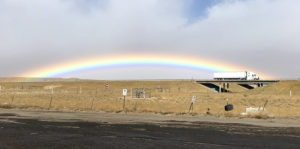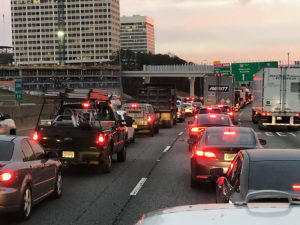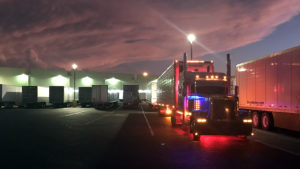Happy New Year is 30 days behind us now, and the bills from Christmas are rollin’ in faster than a large car on their way to a truck show. Everyone has their hand out, and my wallet is running low. Can someone “Show me the money!” It’s a new year and I found the perfect job, so now what? Is it only money that determines your value, or do you equate other items to your financial satisfaction? Do you even know how your value is decided? These are some of the most asked questions when conducting an interview with a new driver. But who ultimately gets to determine what labor you will or should be compensated? All excellent questions, however, there are few with straightforward answers.
For the sake of this article, I will start with refrigerated foods equipment. I think most drivers are familiar with the term lumper. The name refers to people who work on the docks and unload the trailers that need to be broke down or separated by brand or product. They are undoubtedly the most hated aspect in the industry – even more than brokers. These people are independent workers and not company employees. “Why are they so hated?” asked the driver who has never needed to use them. Because drivers must pay them to off-load their freight at the receiver’s dock. In the early days of my career, I earned lots of money breaking down freight for other drivers. To this day, I still do much of my own breakdowns, so I can control the OS&D (over, short, and damaged). It’s not only great exercise, but it breaks the day-to-day routine of driving, too.
Over the years, I have been on both sides of this issue and can see the validity in the system. When a buyer purchases product from a manufacturer or dealer, they do not determine the method of shipment. They normally order it (the product) to be delivered and the shipper or warehouse decides how it moves and where it comes from. They (the shipper or warehouse) then try to consolidate as much freight as possible into one trailer. This can save considerable costs to the customer and makes more revenue available to transportation by combining multiple loads or orders. That’s where we come in but depending on how far removed you are from the original buyer will affect the rate.
No one is working for free, and that includes you, the driver. All these costs are taken into consideration when moving freight. Most of the additional expenses are covered in the carrier contract because they have nothing to do with the receiver. The product was ordered to be delivered according to the buyer’s instructions. The mixing of items and sizes is on the shipper. However, they seldom get blamed, because they loaded the trailer for “no charge” (few drivers realize the cost of that service was paid for in the purchase price). When it comes to unscrambling it – breaking products out to correct size and/or brand – now we (the driver/operator) see those costs directly, by use of cash or some form of electronic payment to a lumper.
The untold secret here is that the unloading fee is also covered by the buyer and is most likely covered in the lease agreements or rate confirmation. These expenses are traditionally paid by the broker and reimbursed to the carrier or paid directly to the lumper service. How many operators see these contracts is questionable, since far too many owner operators trust someone else to search and book their freight. If you are getting paid by percentage of gross, ask to see the rate confirmation. There should be one for every brokered load, and if you’re an in-house carrier, there will be some form of payment that shows what is covered and by whom.
That is a quick summary of who pays for the off-load service, but what about the time? As drivers, everything comes back to the ELD, and how to properly account for your time. All of us have some notion as to how much is enough when we are talking about wages. Revenue equals distance multiplied by rate per mile. All of this must fit in the box marked LEGAL LOG, but that’s where most drivers go off the rails and the problems start. If you are a company driver, it is fairly simple to get an idea of where your wages are going to be (unless you spend hour after hour sitting at some dock waiting to load or unload – then no miles means no money). As they say at the marriage counselor, “And that’s when the fight started.” Driving trucks is a lot like being married, except a divorce (from trucking) probably costs less.
We all must answer to someone when we’re working. There is a common misconception that if you own the truck you are the captain of your own ship and you get to do anything you want. Wrong, wrong and wrong again. All of us answer to a higher authority, even if you do your own dispatch and possibly own the freight in the wagon. There are still rules that must be followed.
I just delivered another quick load to Walmart in Ohio. Now, when we book one of these loads, our people know it can take three or even four hours to get back out the gate and rolling to our next load. There are no surprises here, except on the rare occasion when they get me in and out of here in 90 minutes, like what happened today. We will take our little victories where and when we get them. Was I worried about setting here for more than an hour or two? Not really. We allowed for that when we negotiated the load rate. This is where far too much revenue is lost and the brokers take advantage of unsuspecting operators.
I have this discussion every week with drivers who think they have been cheated. Oftentimes they have, but not by the shipper or receiver. It is usually the paper handlers – the brokerage house or a third person operator – who is more interested in moving the load than they are in providing a quality service. As a company driver, you don’t have a choice in some of this, unless you decide to change carriers and make certain the new one addresses your concerns. I have the luxury of repetitive freight – not always the same loads, but often the same shippers and/or receivers. Today is no different than it was in the old days, and how we still prefer to work with brokers we know and trust.
Not all loads are simple and straight forward – hit the docks, throw on some stuff, and then close the doors. Sometimes there are factors that affect the timelines for shipping. Things out of your control. And the same holds true for the dock workers. I’m reminded of a load coming out of Yuma, Arizona, that should have been a quick in and out “wham bam thank you mam” and on my way. Well, the “wham bam” part worked out alright (I raced right over, got in line, and found a parking spot with a good view of the office), but then that “thank you” part didn’t happen.
As the day wore on, more and more trucks filtered in, but nothing was happening on the docks. The parking lot was full, and drivers were lined up all the way down the street. After a couple hours, I checked back in with the shipper to see if there was a problem. “No driver, no problem. Just no produce.” This is where we all must check ourselves, as this is not the time for a bad attitude. “Okay, can you give me a time frame so I can relay it to our broker?” You see, it’s how you ask your question that gets the best results. I’m not raising six kinds of disrespect with him – I just need to give the people up the chain of command usable information. His answer was, “I can’t tell you a time, but I can tell you we are having trouble today getting the trucks through customs, and they have had a cold night with ice on the plants this morning, so that has set the growers back.” I guess I kinda knew that but wasn’t putting it all together.
This is a situation that happens daily, and most of us are prepared to deal with it. I phoned my broker, got them up to speed, and then set back down in my lawn chain to wait some more. These loads pay well, that’s why we haul them, so I just sat back and let the time add up. The delivery appointment will be questionable now, but it’s a couple days away, and as long as I keep talking with and updating the broker with location reports, there shouldn’t be a problem. The shipper, broker, and receiver are all on the same page now – all I have to do is sit and watch the traffic go past.
Years ago, I had a driver who kept a record of every load she ever hauled. I’m talking all the basic load info, like where it came from and went to, the commodity, it’s weight, and temperature. We came to rely on her for everything from directions to and from shippers to even the name of the receiver if we needed to adjust scheduling. Some habits are worth their weight in gold, and time is still money. How that time is managed does fall partly on the driver, but how one gets paid for this time is as diversified as the freight we move.
Drivers can also influence the time frame simply by maintaining a good positive attitude. It’s better to be thought a fool than to open your mouth and remove any doubt. I try to learn as much about my customers as I can. If they only are receiving a pallet or two, I go out on the dock and help break it down. Sure, it’s cold in that reefer trailer, and sometimes my back hurts when I do multiple stops in one day, but the more I know about their freight, the more information I can relay back to the shipper, putting me in a better position to handle more (and better) loads for them. Not to mention two extra hands sharing the work speeds up the process.
Whenever I’m working with the receivers on the docks, I get tons of useful info like time schedules and rack sizes, even tips on how to better handle difficult commodities, like flowers or ice cream. You might ask what that has to do with time and detention. There are some speed demon drivers out here who have a difficult time keeping shrink-wrapped and palletized freight upright in a locked and sealed trailer. Consider the extra time and effort required to pick packages up off the floor and re-stack them. Often, this product gets rejected by the receiver or customer, and then the nightmare of doing even more paperwork, which eats up even more time, begins.
Ask yourself, who is responsible for damaged freight? If you, the driver, caused the issue, is it fair to expect the receiving company to compensate your time to pick it up? Now, if you are delivering steel to the mill and their crane goes down or there is no one there to operate it, that’s a different story. The fault is by no means a product of the driver. But, when there are damaged or defective products attributed to driver abuse, it’s on you, and you alone. I will continue to repeat the mantra, “You can go down a hill or around a curve too slow all day, but you can only do it too fast once.” Once the damage is done, it’s the driver’s responsibility to deal with the consequences. Next time you’re pushing the limits remember, those seconds you save then could cost you hours later.
I would be remiss not to address tardiness and late deliveries, as well. This is by far the most misunderstood and misused excuse there is. From the receiver’s point of view, there are no acceptable reasons to miss a delivery appointment. They set the appointment times often days in advance, and the receiving company or the end users are not responsible for any aspect of your trip. If you are not there, they go on to whatever is next, and that means you are NOT next in line. If you are the driver who is next to a dock and they slide a driver in that is hours late, how does that sit with you? Well, how does it? That’s what I thought – you get hot as hell, right? I know I do. Remember that next time you are running behind.
If you’re running behind schedule, for whatever reason, start making phone contact early, and save time whenever possible. On the days I have early AM deliveries, I make sure someone calls me one hour before my alarm is set. It’s better to be safe than to hear, “Sorry driver, you missed your appointment. You need to have your dispatcher or broker schedule another one!” I have a standing rule when I haul time-sensitive loads – get as close as possible to the drop before shutting down. When possible, that may mean parking in their driveway. If I’m early and they make me wait, no harm no foul. I’m there if they have time and I’m early if they don’t.
When I was serving in the Marine Corps there was a consistent mindset: “Proper Prior Planning Prevents Poor Performance.” That may not be an exact quote as I remember it (hey, this is a family-friendly publication), but it still holds true in all we do today. How often do we see that one driver throwing a first class fit in the receiving office only to find out they are hungry and disappointed they missed lunch? Sorry about your luck buddy, but had you been thinking about more than your last Facebook post, then you might have been more prepared. I’m a firm believer in keeping Pop Tarts and fruit cups in the truck, as they are “The Breakfast of Champions” and, at times, your best lifeline for survival.
I can’t say how much your time is worth in dollars and cents, but if you value your sanity and want to de-stress, take a lesson from an old hand. Watch the hands on the clock, work when you are supposed to, and be where it is appropriate when you are appointed to be there. Break out the lawn chair and sit in the sun. Wave at the other drivers. If you really want to get back at the dock workers, look like you are having fun (cast your fishing pole out in their lot or driveway – that always drives them crazy). It’s great entertainment for the other drivers around you, too.
Well folks, my phone rang, and my paperwork is now ready in the office. I have put my lawn chair and fishing pole back in the side box, and I’m all hooked up and ready to go – it’s time to get back to work. So, if you see me out there, don’t forget to do “the wave” and say hello. I’m rested and ready to roll. See you on the blacktop, 10-4!




